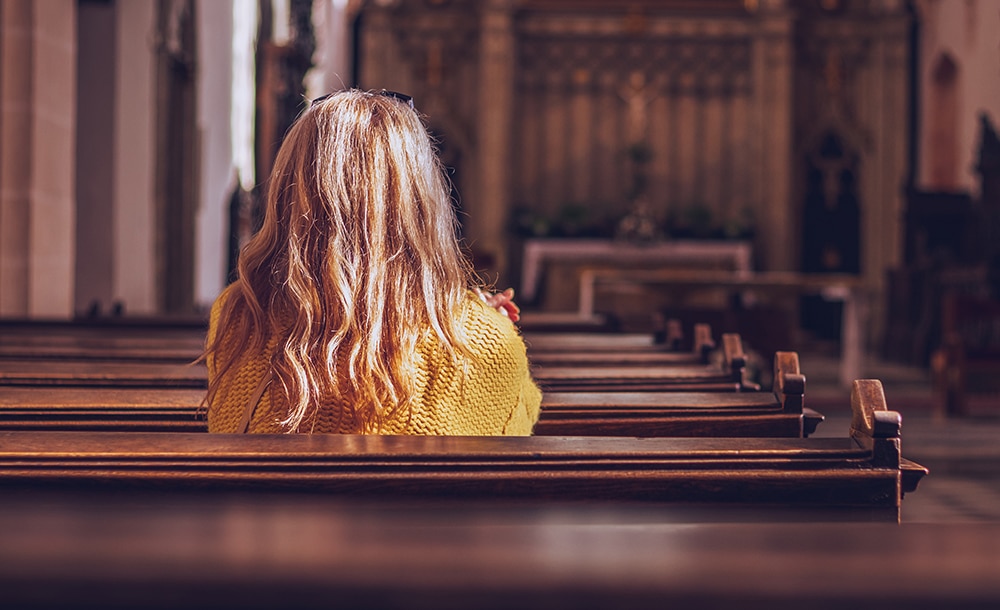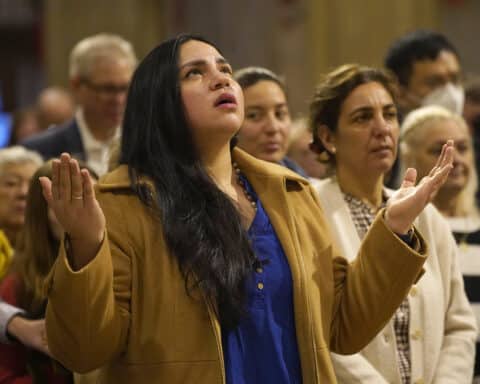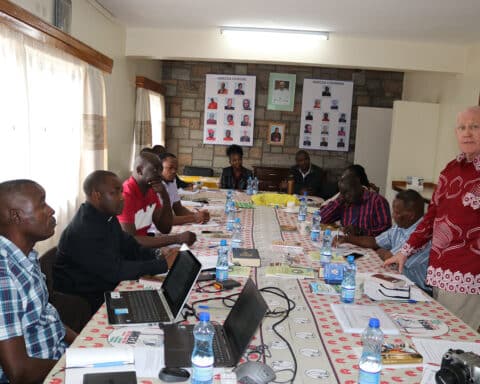Americans who do not identify with any religion — the so-called “nones” — are now as big a part of the country’s population as Catholics and evangelical Christians, according to data from the General Social Survey. The survey, which interviewed more than 2,000 people in 2018, indicates that the religiously unaffiliated, if the present trend continues, will comprise the largest segment of the United States’ population within four to six years.
“This has been going on for 20 years at least. It’s just been a slow and steady march, a point or point-and-a-half every two years that over times adds up to where we are today,” said Ryan Burge, a political scientist at Eastern Illinois University who analyzed the data.
Burge, who is also a Baptist pastor, told Our Sunday Visitor that the survey found that 23.1% of Americans now claim no religion. By comparison, Catholics came in at 23% while evangelicals were at 22.5%. Mainline Protestants comprise about 11% of the populace.
Headlines in the mainstream press heralded that the “nones” now outnumber Catholics and evangelicals, but Burge said the split is more of a statistical tie between those three groups since the results fall within the survey’s margin of error.
“What you can say is the ‘nones’ are as large as the largest group in America,” Burge said.
An urgent call
The General Social Survey — an annual sociological survey conducted by the National Opinion Research Center at the University of Chicago — highlights the secularizing trend in the United States and in the West, especially in the last 40 years.
That trend presents various challenges to the Church, especially in regards to evangelization and convincing new generations of Americans that the Christian faith they think they already know about and found wanting is true.
“This is an urgent call to action for everyone who cares about proclaiming the Gospel. It’s such a shocking development over such a short period of time,” said David Spesia, the executive director for the U.S. Conference of Catholic Bishops’ Secretariat of Evangelization and Catechesis.
Spesia told OSV that Catholics need to understand “the gravity of the situation,” especially since various statistics indicate that for every person who joined the Church at the Easter Vigil, another six to seven “are heading out the back door.”
“We need to recognize that we have a lot of people who might be still in the pews today but who are teetering and could very well not be there tomorrow,” said Spesia, who added that the rising tide of secularization presents “an enormous challenge.”
However, Spesia said the modern realities also pose an opportunity for the Church to realize that “business as usual is not working” and that a fresh approach to presenting the Gospel’s core message is needed.
Not just atheists
The latest data shows that more Americans, especially young adults who fall into the millennial and Generation Z categories, are rejecting or are deeply skeptical of organized religion. In August 2018, the Pew Research Center published a survey that indicated the “nones” question religious teaching and don’t approve of the positions taken by churches on social and political issues.
“There is a general sense in society now that it’s okay to not have a religious affiliation,” said Burge, who added that more Americans beginning in the 1980s began feeling comfortable telling sociologists that they were not religious.
“Now those people have become adults, and they’re raising their own kids in non-religious households,” Burge said. “So those kids then grow up without a sense of religion for them. That’s the default for them.”
Though researchers call them the “nones,” that demographic is more diverse than what might be expected. They are not only atheists, but also agnostics, people who describe themselves as spiritual but not religious and even some who may attend local religious services but don’t consider themselves belonging to an organized religion.
“If you’re unaffiliated, a lot of people take that as synonymous as being atheist or agnostic, and that’s not the case,” said Mark Gray, the director of CARA Catholic Polls and a senior research associate at the Center for Applied Research in the Apostolate at Georgetown University.
Gray told OSV that surveys have actually shown that people who are religiously unaffiliated tend to have the same mixed feelings about hardcore atheists as they do with religiously observant people.
“The reality is a lot more nuanced than what ends up in a lot of these stories,” said Gray, who added that there are several reasons as to why more people, young adults in particular, are choosing not to affiliate themselves with a particular religion.
Americans today are less likely to be members of social groups and fraternal organizations such as the Elks Club. Sociological data indicates that people over the last three to four decades have grown more individualistic in their lifestyles and understandings of relationships.
“This is the generation that can friend and unfriend, like and unlike. There just seems to be less permanence to many of their identities and relationships,” Gray said. “They’re spending more time with digital media and digital realities. It’s a different culture.”
A personal invitation
The data can also partly be read in light of the fact that young adults, particularly Catholics, often stop practicing their religion in the years immediately following their confirmation. As they get married and have kids, some of them return to church to raise their kids with some religious formation.
“Religion has kind of a life cycle,” Gray said. “Some of the unaffiliated will become more religious as they age and seek out a church. It will be important then for the Church to be evangelizing, to be welcoming and to be there for people when they are in that part of their life and searching.”
Spesia, of the U.S. Conference of Catholic Bishops, said there are “authentic reasons for the authentic questions” that people have today, and that it is incumbent on Catholics to do a better job for giving an account of the hope that is within them.
“And it’s not just answering questions that nobody’s asking,” Spesia said. “It’s getting to know people personally, getting a sense for what their particular questions are and what their needs are.”
Spesia said he views Pope Francis’ 2013 apostolic exhortation Evangelii Gaudium (“The Joy of the Gospel”) as a “playbook” in thinking about how to engage people and present the Gospel in an authentic and compelling manner.
“How do we invite people to a renewed personal encounter with Jesus Christ each day?” Spesia said. “How do we look at everything we do through an evangelization lens? How do we give witness to the Jesus Christ is leading and guiding us today?”
Brian Fraga is a contributing editor for Our Sunday Visitor.





